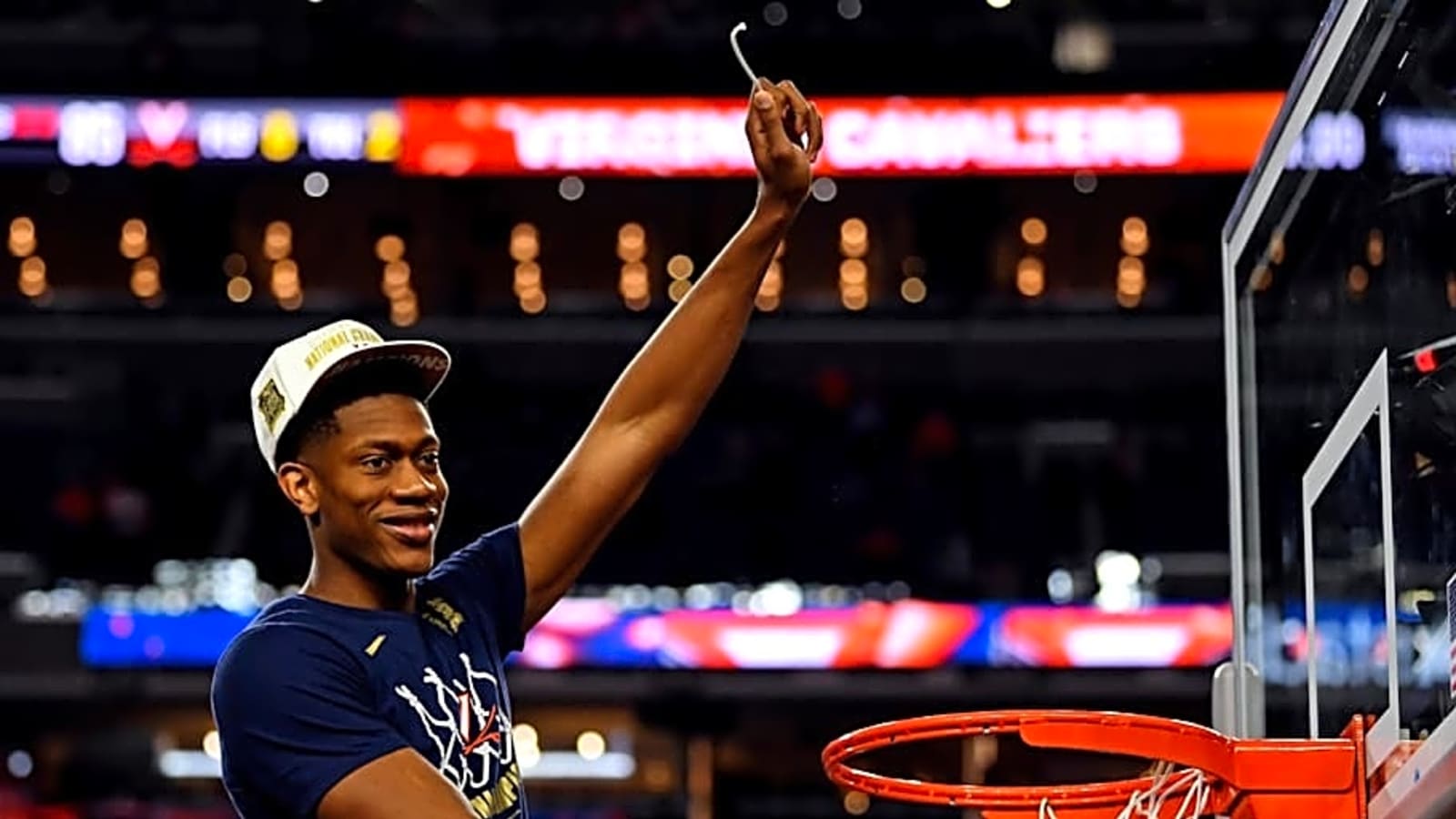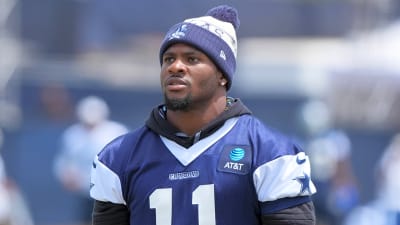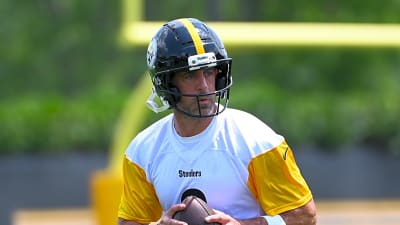
In the thick of the offseason, let’s dive into the last 25 years of Virginia men’s basketball and discuss who cracks the starting five of the 21st Century. With no Ralph, who takes the center spot? Will it be 2019-dominated or spread across the 2000s? I’ll reveal each player, followed by a list of their accolades and a skinny as to why they belong in the top rung.
*I’ve grandfathered Roger Mason and Travis Watson into this list, despite the fact that they started their careers in Charlottesville prior to 2000.
Guard: Ty Jerome (2016-2019)
Accolades: Second-Team All-ACC (2019), NCAA All-Tournament Team (2019)
Backup: J.R. Reynolds (2003-07), London Perrantes (2013-17), Reece Beekman (2020-24)
Jerome is the runaway pick for this slot despite Reynolds’ one-two scoring punch with Singletary, Perrantes’ longevity with some high-achieving Cavalier squads and Beekman’s defensive chops. The 6’5” New York native captured the program’s first NCAA Championship in 2019 and was selected with the 24th pick in the subsequent NBA Draft, leaving Charlottesville after his junior season. While the numbers aren’t jaw-dropping when compared to ‘Hoos of the 2000s, Jerome dissected defenses with his savvy, methodical style of play and finished with a career-high 13.6 PPG and 5.5 APG his final year. Clutch play against the likes of Purdue, Auburn, and Texas Tech cements Jerome’s case as the starting point guard for this all-21st Century team. He is too good to be overlooked.
Guard: Sean Singletary (2004-08)
Accolades: 3x All-ACC First Team, 2004-05 All-ACC Freshman Team
Backup: Kyle Guy (2016-19), Sylven Landesberg (2008-10)
While Singletary missed the party of the 2010s, he was busy pacing Pete Gillen and Dave Leitao’s teams as an elite scorer and Duke slayer. No Cavalier since has matched Singletary’s 19.8 PPG clip, and he twice hit the 19.0 PPG threshold. Despite his smaller size (6’0”), I’ll give the advantage to Singletary over the likes of Kyle Guy and Sylven Landesberg because of his strength as a passer and scorer. I would be remiss if I did not include Singletary in this starting five — a bright spot of the 2000s — even if he’ll likely concede ball-handling duties to a national champion in Jerome. Also a clutch player, Singletary etched himself into John Paul Jones immortality with a buzzer-beating jumper to upend the Blue Devils, 68-66 (OT), in 2007.
Guard: Malcolm Brogdon (2011-2016)
Accolades: 2015-16 ACC Player of the Year, 2015-16 ACC Defensive Player of the Year, 2015-16 First-Team All-American, 2014-15 Second-Team All-American, 2015-16 NABC Defensive Player of the Year, 2x First-Team All-ACC
Backups: Roger Mason (1999-2002), Joe Harris (2010-14)
The easiest pick of them all, Brogdon spearheaded Bennett’s magical emergence in the mid-2010s and led the ‘Hoos to Sweet Sixteen and Elite Eight appearances in 2014 and 2016, respectively. The 6’5” shooting guard led Virginia in scoring across three consecutive seasons (2013-2016) and garnered a host of honors in his senior campaign as evidenced by a 18.2 PPG, 3.1 APG, and 39.1% 3PT statline. Brogdon’s basketball IQ on the other side of the court also earned him the NABC’s Defensive Player of the Year title in 2016. One can only look to center Ralph Sampson as a more decorated ‘Hoo, as the Atlanta native was instrumental in bringing Virginia basketball back into the forefront of national conversations.
Forward: De’Andre Hunter (2016-19)
Accolades: 2018-19 ACC Defensive Player of the Year, 2018-19 Third-Team All-American, 2019 NCAA All-Tournament Team, 2017-18 All-ACC Freshman Team, 2017-18 ACC Sixth-Man of the Year
Backups: Travis Watson (1999-2003), Anthony Gill (2013-16), Sam Hauser (2019-21)
The groups start to get a bit thinner as we advance from Virginia’s stacked backcourt lineage, but Hunter headlines the bigs. Although a smaller power forward option, Hunter’s defensive versatility at Virginia and his gamewrecking ability (i.e. Texas Tech) cannot be overlooked. He burst onto the scene as a redshirt freshman in 2017-18, having notably given then-No. 4 Duke fits until a wrist injury derailed the rest of his season and proved to cost the ‘Hoos in the Big Dance. One of the “trio” alongside Jerome and guard Kyle Guy, Hunter looked like a man amongst boys in his final campaign; moreover, he checks off our clutch criterion thanks to an overtime layup against Purdue and three-pointer late into regulation against Texas Tech — both season-saving moments in the 2019 NCAA Tournament. He and Brogdon will provide a physical, defensive boost for this starting five.
Forward: Mike Scott (2007-12)
Accolades: 2011-12 First-Team All-ACC
Backup: Akil Mitchell (2010-14), Jay Huff (2017-21)
An early Bennett product and a Virginia native, Mike Scott steadily improved in his five years in Charlottesville and capped off an illustrious career with an 18.0 PPG, 8.3 RPG statline in 2011-12. Scott, a terrific low-post scorer, provides an uber-athletic duo with Hunter in the frontcourt, even if we’ll be without a true center in the lineup. Arguably, no position is weaker, however, than that of the center spot from 2000 on. It would also be a mistake to pass up his efficiency on the interior and his strength on the glass. If Scott is overwhelmed by centers, we can roll out the 7’1” Huff or 6’8” Mitchell — a defensive guru who pestered opponents despite his size. Another NBA veteran alongside Jerome, Brogdon, and Hunter, Scott played for four different teams over ten years.
21st Century Starting Five, in summary:
G: Ty Jerome (2016-19)
G: Sean Singletary (2004-08)
G: Malcolm Brogdon (2011-16)*
F: De’Andre Hunter (2016-19)*
F: Mike Scott (2007-12)*
* = redshirted at least one year at Virginia
More must-reads:
- Surprising update emerges about Jayson Tatum's recovery
- Dolphins' Tyreek Hill stirs up drama, calls for teammate to be benched in certain situations
- The '250-strikeout MLB seasons' quiz
Breaking News
Trending News
Customize Your Newsletter
 +
+
Get the latest news and rumors, customized to your favorite sports and teams. Emailed daily. Always free!








